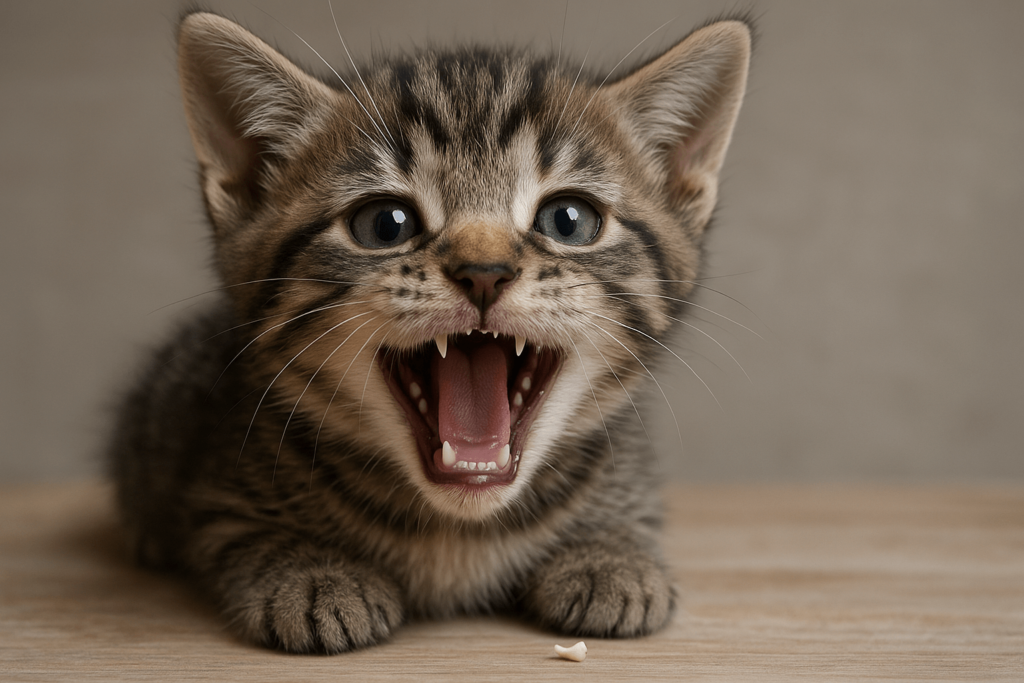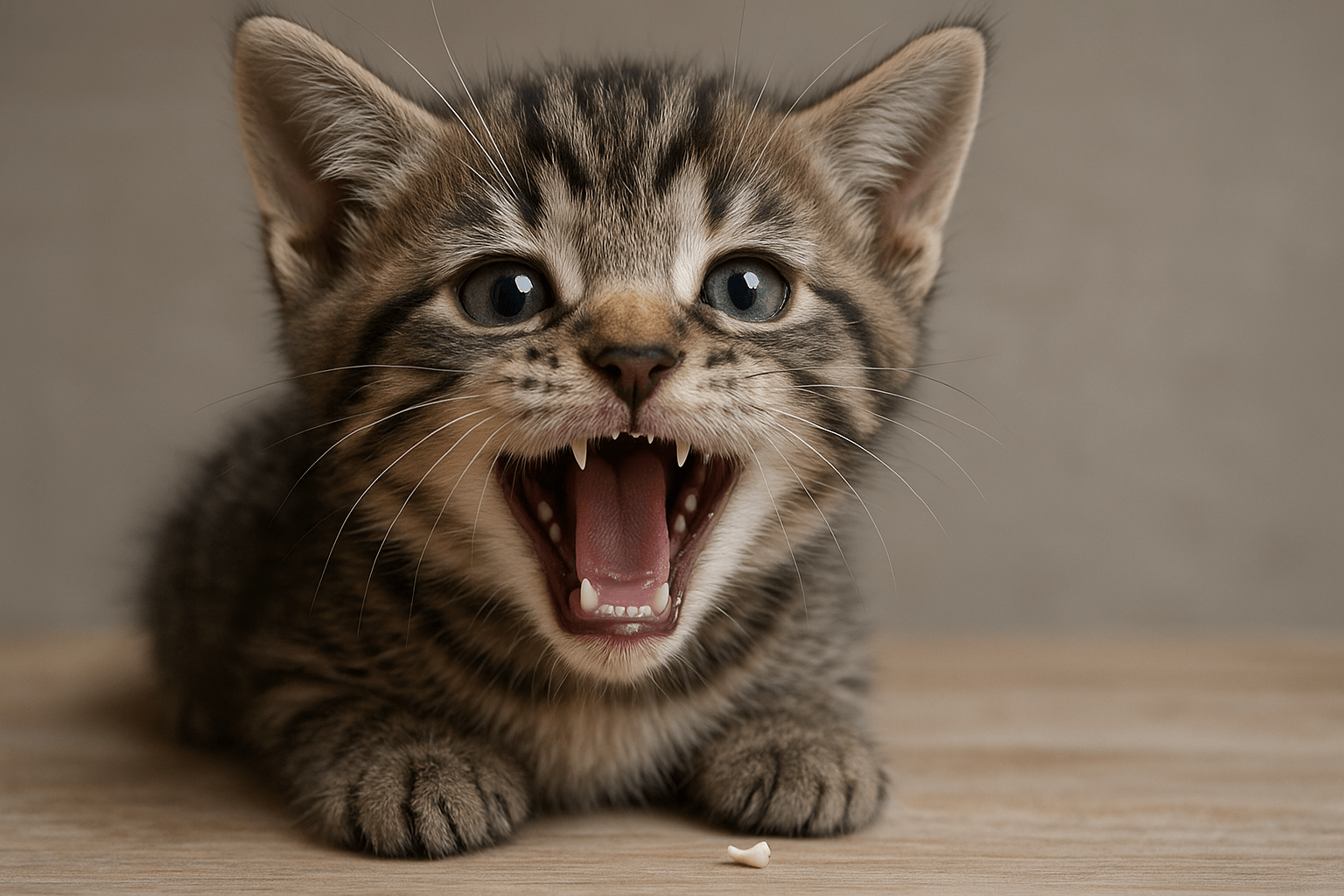Cat Baby Teeth Falling Out: What Every Cat Owner Should Know
Watching your kitten grow up is an exciting journey, filled with milestones like the loss of their baby teeth. Just like human children, kittens are born with a set of deciduous (baby) teeth that eventually make way for their permanent adult teeth. Understanding this natural process can help you ensure your kitten’s dental health remains in top shape. In this guide, we’ll explore everything you need to know about cat baby teeth falling out, including when it happens, what to expect, and how to support your kitten during this phase. Let’s dive into the fascinating world of feline dental development!
When Do Cat Baby Teeth Fall Out?
Kittens typically begin losing their baby teeth around three to six months of age. This timeline can vary slightly depending on the individual cat, but the process generally follows a predictable pattern. Here’s a breakdown of what to expect during this stage:
First Signs Around 12 Weeks:
At around 12 weeks old, kittens may start teething as their adult teeth begin to emerge beneath their baby teeth.Baby Teeth Loosen Between 3-4 Months:
The incisors (front teeth) are usually the first to fall out, followed by the canines and premolars.Completion by 6 Months:
Most kittens will have all their adult teeth by six months of age, completing the transition from baby to permanent dentition.Teething Behaviors Become Noticeable:
During this period, you might notice increased chewing, drooling, or slight irritability as your kitten adjusts to their new teeth.No Need for Alarm:
Losing baby teeth is a normal part of kitten development, and there’s rarely cause for concern unless complications arise.
Understanding these stages prepares you to monitor your kitten’s progress and identify any potential issues early on.

Signs Your Kitten Is Losing Baby Teeth
Recognizing the signs of teething can help you provide proper care and comfort to your kitten. Look out for these common indicators that your kitten’s baby teeth are falling out.
Finding Tiny Teeth Around the House:
You may stumble upon small, sharp baby teeth in your kitten’s bedding or near their favorite chewing spots.Increased Chewing Behavior:
Kittens often chew on toys, furniture, or even your fingers to relieve discomfort caused by emerging adult teeth.Red or Swollen Gums:
Teething can cause mild inflammation in the gums, which may appear redder than usual.Drooling More Than Usual:
Excessive drooling is a common side effect of teething as saliva production increases during this phase.Changes in Eating Habits:
Some kittens may eat less or prefer softer foods temporarily while their gums adjust to new teeth.
By staying observant, you can better understand your kitten’s needs and offer appropriate support during this transitional period.
Check this guide 👉Healthy Cat Teeth vs Unhealthy: Best 7 Expert Tips!
Check this guide 👉Understanding Cat Teeth Plaque: Best 7 Expert Tips!
Check this guide 👉How Should Cat Teeth Look? Best 7 Expert Tips!
What to Expect During Teething | How to Support Your Kitten |
|---|---|
Increased chewing behavior | Provide safe chew toys |
Finding loose or lost baby teeth | Check for retained baby teeth regularly |
Redness or swelling in the gums | Offer wet food if eating becomes painful |
Drooling or mouth sensitivity | Keep water bowls clean and accessible |
Temporary appetite changes | Monitor weight and hydration levels |
How to Care for Your Kitten During Teething
Supporting your kitten during teething involves both physical care and emotional reassurance. These tips will help you keep them comfortable and healthy throughout the process.
Provide Safe Chew Toys:
Offer soft, durable chew toys designed specifically for teething kittens to satisfy their urge to gnaw.Inspect Their Mouth Regularly:
Gently check your kitten’s mouth for signs of retained baby teeth, which can lead to dental problems if not addressed.Offer Soft Food Options:
If your kitten seems reluctant to eat dry kibble, switch to wet or softened food temporarily to ease discomfort.Keep Playtime Gentle:
Avoid rough play that could accidentally hurt your kitten’s sensitive gums during this time.Schedule a Vet Visit if Needed:
Consult your veterinarian if you notice persistent redness, swelling, or difficulty eating, as these could indicate underlying issues.
With attentive care, you can ensure your kitten transitions smoothly to their adult teeth without unnecessary stress.
Potential Complications to Watch For
While teething is usually straightforward, complications can occasionally arise. Being aware of these possibilities allows you to act quickly if needed.
Retained Baby Teeth:
Sometimes, a baby tooth doesn’t fall out when the adult tooth emerges, leading to overcrowding and potential decay.Misaligned Adult Teeth:
Improper alignment can occur if the adult teeth don’t grow in correctly, requiring professional intervention.Gum Infections:
Persistent redness, bleeding, or swelling in the gums could signal an infection that needs veterinary treatment.Difficulty Eating or Drinking:
If your kitten avoids food or water entirely, it may indicate significant discomfort or pain.Broken or Damaged Teeth:
Accidents during play or teething can result in fractured teeth, which require immediate attention.
Promptly addressing these issues ensures your kitten maintains optimal oral health as they mature.
Tips for Choosing Chew Toys
Selecting the right chew toys can make a big difference in keeping your teething kitten happy and healthy. Consider these factors when shopping for safe options.
Opt for Soft Materials:
Look for toys made from soft rubber or fabric that won’t damage delicate gums.Avoid Small Parts:
Ensure toys don’t have small pieces that could break off and pose choking hazards.Choose Interactive Designs:
Toys with textures or ridges massage gums and encourage playful exploration.Check for Durability:
Kittens love to chew vigorously, so select sturdy toys built to withstand heavy use.Prioritize Safety Certifications:
Choose products labeled as non-toxic and safe for pets to ensure peace of mind.
Investing in quality chew toys supports your kitten’s dental development while keeping them entertained.
How to Maintain Long-Term Dental Health
Once your kitten’s adult teeth are in place, maintaining good dental hygiene becomes crucial for lifelong health. Follow these steps to promote strong teeth and gums.
Establish a Brushing Routine:
Gradually introduce daily toothbrushing using pet-safe toothpaste to prevent plaque buildup.Schedule Regular Vet Checkups:
Annual dental exams help detect early signs of disease or abnormalities before they worsen.Monitor Diet Choices:
Feed high-quality food that supports dental health, avoiding sugary treats that harm teeth.Encourage Natural Chewing:
Provide safe chews or toys that mimic natural behaviors to keep teeth clean and strong.Watch for Warning Signs:
Be alert to symptoms like bad breath, drooling, or difficulty eating, which may indicate dental issues.
Consistent care ensures your cat enjoys a lifetime of healthy smiles.
Fun Facts About Feline Teeth
Cats’ teeth are fascinating structures that play a vital role in their survival and behavior. Here are some intriguing facts about feline dentition.
Cats Have Fewer Teeth Than Dogs:
Adult cats typically have 30 teeth, compared to dogs’ 42, reflecting their carnivorous diet.Teeth Are Designed for Hunting:
Sharp canine teeth and slicing premolars enable cats to tear meat efficiently.Baby Teeth Are Razor-Sharp:
Kittens’ deciduous teeth are incredibly sharp, aiding them in learning bite inhibition during play.Adult Teeth Emerge Quickly:
The transition from baby to adult teeth occurs rapidly, usually within just a few months.Dental Issues Are Common in Cats:
Up to 70% of cats over the age of three develop some form of dental disease, emphasizing the importance of preventive care.
Learning about your cat’s teeth deepens your appreciation for their unique biology and reinforces the value of proper dental care.
Frequently Asked Questions About Cat Baby Teeth Falling Out
Is it normal for kittens to swallow their baby teeth?
Yes, it’s common for kittens to accidentally swallow their tiny teeth while eating or grooming.
Should I pull out a loose baby tooth myself?
No, allow the tooth to fall out naturally to avoid causing pain or injury to your kitten.
Can teething cause bad breath in kittens?
Mild odor is normal due to teething, but strong or foul-smelling breath could indicate an infection.
Why does my kitten chew on everything?
Chewing helps relieve gum discomfort caused by emerging adult teeth.
When should I start brushing my kitten’s teeth?
Begin introducing toothbrushing once their adult teeth are fully grown, using pet-safe toothpaste.
Embracing the Teething Journey with Your Kitten
The process of cat baby teeth falling out is a natural and essential part of your kitten’s growth. By understanding the timeline, recognizing the signs, and providing supportive care, you can help your furry friend navigate this phase comfortably. Remember, patience and attentiveness go a long way in ensuring your kitten develops strong, healthy adult teeth. With proper care, you’re setting the foundation for a lifetime of excellent dental health—and strengthening the bond between you and your beloved companion along the way.
Canned Pumpkin for Cat Diarrhea: Best 7 Expert Tips! Natural remedy to firm stools, soothe upset bellies, and support gut health safely.
Can a Cat Give You Scabies? Best 7 Expert Tips! Discover the truth about feline mites, human skin risks, and how to protect yourself—without panic.
Cat Flea vs Human Flea: Best 7 Expert Tips! Discover the truth about bites, species, and how to eliminate infestations for good.
Weird Cat Behaviors: Best 7 Expert Tips! Discover why cats do strange things—and how to understand, not punish, their instincts for a happier home.





